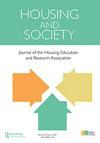在越南河内的工业区生活和工作如何影响健康结果
Q2 Social Sciences
引用次数: 0
摘要
摘要始于1986年的越南国家经济改革运动,被称为Doi Moi,旨在将越南与全球生产链联系起来,从而鼓励更多的外国投资。这些改革带来了快速的经济增长和城市化,使现代越南成为东南亚增长最快的经济体之一。截至2018年,越南国家政府已指定326个工业区,共吸引了价值418亿美元的内资和1450亿美元的外资。本研究评估了越南河内工业区工人健康状况的相关因素。通过分析501项对居住在工业区非正规部门住房中的工业工人家庭的调查,我们考察了影响身心健康结果的人口、社会环境、住房和职业因素。这是对越南工业区非正规住房的首批研究之一,对工业区的生活和工作环境如何影响工人健康进行了探索性分析。性别是一个突出的指标,是健康结果的有力和重要预测因素。在我们的研究中,我们发现女性在所有四项健康指标上的表现都更差。本文章由计算机程序翻译,如有差异,请以英文原文为准。
How living and working in industrial zones affects health outcomes in Hanoi, Vietnam
ABSTRACT The national economic reform movement that began in 1986 in Vietnam, known as Doi Moi, included efforts to connect Vietnam to the global production chain, thereby encouraging more foreign investment in the country. These reforms led to rapid economic growth and urbanization, positioning modern day Vietnam as one of the fastest growing economies in Southeast Asia. By 2018, the Vietnamese national government had designated 326 industrial zones, attracting a total of US$41.8 billion worth of domestic capital and US$145 billion in foreign capital. This study evaluates the factors associated with health outcomes for industrial zone workers in Hanoi, Vietnam. Analyzing 501 surveys of industrial worker households living in informal sector housing in industrial zones, we examine demographic, socio-environmental, housing, and occupational factors in shaping physical and mental health outcomes. This is one of the first studies of informal housing in industrial zones in Vietnam which provides an exploratory analysis of how living and working environments in industrial zones affects the health of workers. Gender is one indicator that stands out as a robust and significant predictor of health outcomes. We find that women fare worse on all four measures of health outcomes in our study.
求助全文
通过发布文献求助,成功后即可免费获取论文全文。
去求助
来源期刊

Housing and Society
Social Sciences-Urban Studies
CiteScore
2.30
自引率
0.00%
发文量
10
期刊介绍:
Housing and Society is the journal of the Housing Education and Research Association (HERA). The journal supports the mission of HERA by providing for the dissemination of research and other scholarly work. Submissions from a broad range of perspectives are encouraged. Topics in housing include: policy, design, social aspects, gerontology, behavioral aspects, energy/environment, equipment, interiors, economics, theory/model development, education, and program development or evaluation. The journal welcomes the submission of original research articles, notes and commentaries. Notes are shorter manuscripts presenting succinct information on housing related to one of the following categories: - Research: exploratory or not heavily theory-based or statistically analyzed - Academic: innovative teaching ideas - Program: development, implementation, and/or evaluation of Cooperative Extension or other housing programming efforts - Policy: examination of policy impact, comparative analysis, and/or need to achieve housing goals - Reviews: books, documentaries, etc.
 求助内容:
求助内容: 应助结果提醒方式:
应助结果提醒方式:


